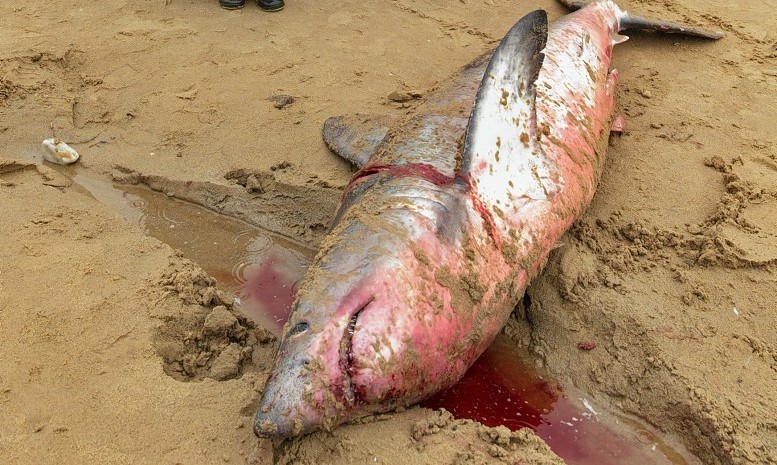Moray villagers got a close look at one of nature’s most feared predators at the weekend when a shark washed ashore on a beach.
The deceased Porbeagle shark proved a huge talking point among Cullen residents, who flocked to its bay to inspect the 7.5ft beast on Saturday.
Wildlife experts said it was likely the female shark died in the deeper waters it normally resides, before being dragged inshore by the tide.
One Cullen family said the unexpected guest gave their youngsters a grisly but fascinating glimpse into marine life off Moray’s coast.
Iain and Karen Drummond brought son Colin, five, daughter Holly, three, and 18-month-old Eileidh to the shore to survey the stricken animal.
Mr Drummond said: “Colin was quite amazed that there was such a huge shark right there in front of him.
“It was a great insight into local wildlife – we often see dolphins here, but this was something we hadn’t expected.
“The children were very excited by it. It was a bit of a shame that it was dead but it was interesting to see.”
Lauren Smith works as a marine biologist at Macduff Marine Aquarium and performed an autopsy on the shark on Saturday evening.
She said the cause of its death remains a mystery.
Miss Smith said: “We took a few samples from the shark, and a lot of photos, which will now be sent off to Shark Trust to see if they can ascertain what caused it to die.
“Apart from one cut on its back it was in pristine condition, so it was really interesting to look at.
“There was no damage caused by hooks or nets, and we’re now trying to figure out if that cut is what caused it to die.
“The gouge may have been caused by a boat propeller.”
After the animal had been dissected it was left by the Cullen shoreline for the tide to take it away.
Miss Smith added that the shark would have been old enough to breed, and that its death was a loss for a species whose numbers are in freefall.
After decades of being heavily fished, the European Union enforced a ban on catching them in 2010.
Although Portbeagle sharks are physically capable of harming people, there has never been a confirmed case of one killing a human.

